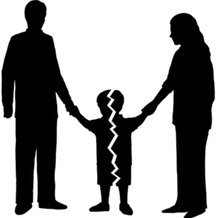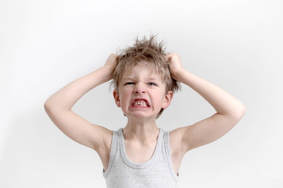|
I am often asked when is the best time to talk to your child about sex. The short answer is as soon as they are born. This may leave some of you scratching your heads, wondering what I mean. The first step in teaching your children about sex is identifying body parts with the correct names. Use the right words, penis, testicles, vagina, labia, etc. This normalizes the vocabulary and starts to reduce the discomfort some of us have talking about this topic. But, the biggest rule of thumb is: answer all of your child’s questions accurately, but in an age appropriate manner, giving no more information than they ask for. Depending on your child, this can lead to embarrassing situations.
When my daughter was 3 1/2, I was pregnant with her brother. She was always very inquisitive and started asking questions immediately. How did the baby get in there? How did Daddy help make the baby? How exactly did he do that? How will the baby come out? An avid reader about child development, I knew that I should answer her questions but eventually had to make a judgement call to stop. Good thing, too. One day, we were riding on a city bus when a large man boarded the bus. My daughter looked him straight in the eye and asked, “Do you have a penis?” Understandably flustered, he didn’t answer. Without missing a beat, she then asked, “Do you use your penis to make babies like my daddy did?” I was horrified and got off at the next stop, far from our destination, just to get away from the looks I was getting from the conservative riders. As uncomfortable as that and other moments were, I was never sorry that we were so open about those conversations. We never had a “big talk.” It was ongoing, and my children talked to me about everything. I was never uncomfortable with our conversations, and neither were they. I also never worried about them having unsafe sex. It makes me sad to think about the numbers of kids who aren’t educated about sex except at school. It’s not the job of our schools to teach our children about sex. It’s ours. When we teach them about sex, we do it in the context of relationships. We model behavior for them everyday. We are modeling relationships, too. Sex is a part of a healthy adult relationship. Why hide that? My own parents were very much in love and very physical with each other. Although they were of a generation who didn’t feel comfortable talking with their children about sex, they modeled a healthy affection for each other, and my brother and I loved seeing them hug and kiss, and we would giggle when we saw Dad pull Mom onto his lap for a quick snuggle. My younger grandchildren love the game of acting grossed out when my partner and I kiss or hug. They say “ew” as they laugh and laugh. The more they react, the more we show them our love for each other. They know that and play along, reacting more and more animatedly. My older grandson, who is now 25 and used to play that same game, gave me one of the best compliments not long ago. He said that his current relationship reminds him of mine, so he knows it must be the real thing. That makes me so happy for him and for me. When my teenaged granddaughter talks to me about her relationships and about sex, I am reminded that I have approached the topic well. When we’re uncomfortable talking about something, it makes it mysterious and sometimes more attractive due to that mystery. In my opinion, openness and honesty are always the best policies.
0 Comments
How do you navigate a relationship with an ex whom you no longer like? Or maybe you are still in love, but the pain is too hard to deal with at this time. I think it’s important to remember that these separations are hard on everyone, no matter how it came about or who was responsible. But, as hard as it is for the adults, it’s even harder on the children. The good news is ... there are some things we can do to make it a little easier on them.
The first rule of thumb is, “Never talk badly about your former partner!” It won’t always be easy. We all start out thinking that we will have no trouble with it, then something happens to spark our emotions. All of a sudden, the words come out. It takes a huge concerted effort sometimes to bite your tongue. But it’s even harder to remember not to talk about your ex on the phone with a friend while your children are in listening distance. We don’t always know that the kids are nearby. They are often out of sight but still within earshot, hearing things that they shouldn’t, so it takes even more awareness. Another important thing is, after the hardest part of the break-up is over, try to get along. My own children have told me how important it was to them that their dad and I remained friends. We were all still a part of the family. It was hard in the beginning, we did struggle to get along sometimes, but we didn’t have to see each other when we didn’t want to. Eventually, we became much better friends than when we were married, and I helped him pass at the end of his life. Make sure your children get enough time with each parent. When you are not the parent with physical custody, it’s easy to fall into that “sugar daddy” role. These are the parents who spend lots of money, give gifts, go on spectacular trips and more but don’t do the everyday disciplinary things. These parents don’t have to nag about homework and set limits. If you are in this role, try to be sensitive to your ex-partner's struggles. Equal time is the best plan, if it can be arranged. Your children love you both and need the same amount of time with each of you. The exception to this is if there is abuse of some kind. You must protect your children from abuse, but differences in parenting styles are okay. That's one of the advantages to having two parents. Lastly, back up the other parent. If your children think they can divide and conquer, they will go all out to do that. You won't know which way the wind blows. Always assume that the pther parent is doing the right thing and check with them. Don't automatically side with your child before investigating what really happened. We all know how dramatic children can be, blowing things way out of proportion. As much trouble as your child is making with you, you can bet they are doing the same at their other home. Don't allow that disruption to take hold. Try to remember that you chose to be with that other adult because you saw the good in them. Try to keep seeing that good, and you'll be doing your whole family a huge favor. This is another requested post. I really enjoy addressing topics that are relevant to you, so please continue to send your ideas to me. I've had tons of experiences with all types of behaviors and family issues with my own three children as well as others I have helped raise and my 40 + years of early-childhood teaching experience and am always happy to share what I've learned.
It is not unusual for children to exhibit signs of aggression during stressful times. It is not unusual for them to exhibit these signs even when we're not aware of their stress. The most common occurances are when a new baby comes into the home, after a move and leading up to a move, starting daycare or school or other big changes in their lives such as a parent going back to work after being home, divorce or separation, etc. But these are not the only reasons that children lash out at others. Some children have sensory issues and go into a panic mode when feeling cornered. Young children that bite often fall into this category. They are not "bad," they are just overstimulated or possibly are feeling cornered. I've seen many toddlers bite another child when they are literally up against a wall. When they do this, you can see the intensity in their body language and a wildness in their eyes. They are frightened and don't know how to keep themselves safe. If you have a "biter," it's important to notice what's happening around them and protect not only the opther children but your own child as well. When they hurt someone else, it is most often very sudden. Afterwards, they are confused and sad. They don't actually want to hurt their friends, but they are out of control of their emotions. Please don't tell them that they are bad, and don't yell at them or hit them. These are great ways to escalate the situation and cause more harm. There are so many great statements to use such as: "I can see you are feeling scared (angry, worried), but I don't want you to bite (hit, punch, kick) because that hurts people." "I can see that you feel sad about hurting your friend (brother, sister), is there anything you would like to say to them?" Insisting on an apology can be insignificant if your child is just repeating required words. They need to understand what they are saying and truly feel it. When I worked in an alternative school, we would bring children together, face-to-face, and have them talk to each other with supervision. If one child hurt another, the offender would have to face the hurt child while they cried and then talk to them when they were finished. No one likes to see someone cry, especially if you have been the cause of that crying. It changes the situation from aggression into compassion. Saying the words "I'm sorry" doesn't always equal compassion. It's often an automatic response without any real remorse. But feeling the discomfort of facing a crying victim makes it all very real. Once everyone has calmed down, you can all work together to decide what happens next. Then there are children who act out because they are facing tough (for them) issues. These children need to talk about what's going on in their lives. If they are resistant to talking, they can draw pictures. That often leads to some great conversations. We may think that our eldest child has accepted that new baby when suddenly, they throw a toy at him or her. They may start to give them a hug then suddenly, it's a choke hold. Again, they are not bad. They are showing you how upset they are with this new arrangement. Grab them up in a loving way, hugging and kissing them, showing them how much you love them and how important they are to you. Then talk to them about the inappropriate behavior. You can get them to realize how much they love their sibling and how much they are loved in return. When we punish this behavior, we help instill resentment. Suddenly, they are bad and the baby is the good one. That's not really the message we want to relay, is it? However, we do need to set limits and have concrete consequences. They did behave badly. Notice I said, "behave badly" not "are bad." There is a huge difference. Words are important, but so are actions. If your child bites or hits someone else, there needs to be an immediate consequence. Rather than saying, "You will be in a timeout." Try putting them in a timeout immediately. If they have had the opportunity to talk with the hurt child, ask what they think is an appropriate consequence. Children often surp[rise me with their sense of fairness even when it involoves giving themselves a consequence or punishment. When we encounter these behaviors in older children, it's a much bigger problem. This is something that needs to be taken very seriously. What is going on in their lives that is making them act out in this way? Can you get them to talk about it? It may be harder for them to talk to you, but maybe a family friend or a professional can help out here. Some couselors get children to act out their problems with puppets. Some older children can write fictional stories or draw pictures, make comic books. People behave aggressively for reasons that we may or may not be aware of, but it's important that they not stuff those feelings inside where they can fester and become even bigger. If you are unable to listen without getting upset yourself, please ask for help. Sometimes, the best listeners are those that are outside of the situation. As in the paragraph above, there need to be strong, concrete consequences involved. With older children, it's even more important for them to be involved in that decision. Be careful, though. They will often give themselves much too harsh sentences out of their own guilt. You need to provide the balance. We all feel shame or embarrassment when our children behave badly. We want them to be well-behaved, perfect kids. But, it doesn't always turn out that way, and it's not our faults. Our children are individuals and will react and behave in unique ways. They will keep growing and changing, facing new challenges. Who knows how they will meet those challenges. We just need to remember that they are inherently good and support them even during those uncomfortable times. I believe that everyone can be healed through love and understanding, as long as we don't ignore the issues. For more ideas: http://www.indiaparenting.com/home-/124_6127/tips-for-handling-an-aggressive-child.html |
Archives
April 2019
Categories |




 RSS Feed
RSS Feed